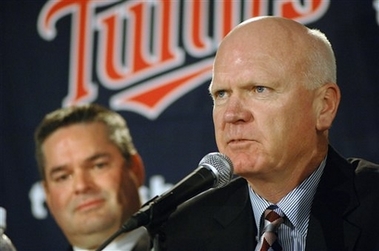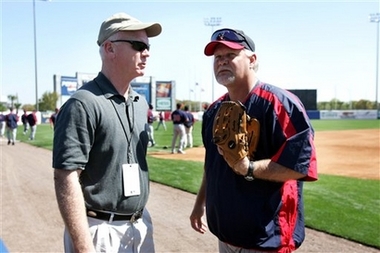September 13, 2007
The End of An Era: Ryan Steps Down as GM
Ryan's tenure began with six straight losing seasons as the Twins struggled to build around a string of failed prospects, but he eventually began to get things right. In what would be the last of Tom Kelly's 16 seasons as manager, the Twins won 85 games in 2001 for their first winning season in a decade. With a formidable young core in place thanks to strong drafts and Ryan's trading ability, Ryan replaced Kelly with Ron Gardenhire and the 2002 season saw the first of four division titles in five years.
Even now, as the Twins play out the final month of what has been a tremendously disappointing year, the team has a chance to finish with a winning record for the seventh consecutive season. That recent success, combined with the promise of a new ballpark in 2010 and several huge personnel choices looming, makes Ryan's decision to leave his post now a shocking one. He leaves having produced a 1,016-1,053 (.491) overall record and four playoff berths in 13 seasons.
 Longtime assistant Bill Smith takes over as GM and will no doubt attempt to keep the key components of Ryan's regime in place, which means that the Twins will likely continue to focus on scouting and player development. Ryan excelled on the macro level, turning the Twins into one of the premiere organizations in baseball on a limited budget by putting a system in place that thrived at identifying, acquiring, and developing young talent.
Longtime assistant Bill Smith takes over as GM and will no doubt attempt to keep the key components of Ryan's regime in place, which means that the Twins will likely continue to focus on scouting and player development. Ryan excelled on the macro level, turning the Twins into one of the premiere organizations in baseball on a limited budget by putting a system in place that thrived at identifying, acquiring, and developing young talent.
From Johan Santana, Joe Mauer, and Justin Morneau to Torii Hunter, Francisco Liriano, and Joe Nathan, Ryan found a way to stock the team with star-caliber long-term building blocks despite monetary limitations making it extremely difficult to acquire such players via free agency. He presided over a string of productive drafts that can be traced back to the strong emphasis on scouting and had an unmatched knack for getting incredible value from veteran-for-prospect trades.
When it comes to the big things, namely bringing in and developing talent, few GMs can match Ryan's track record. However, as fantastic as Ryan was at managing the big picture, he often struggled on the micro level. While he set the Twins up for success by putting championship-level building blocks in place, Ryan seemingly had difficulty fully trusting all the young talent he had assembled and frequently blocked young players by bringing in mediocre veterans to surround his stars.
Ryan's day-to-day weaknesses as GM also happened to be the areas that are easiest for outsiders to analyze. It's difficult to offer insight into large-scale organization building or scouting principles, but it's easy to see that someone has failed to fill gaping holes in the lineup while choosing to surround young talent with the likes of Juan Castro, Tony Batista, Sidney Ponson, and Ramon Ortiz. For people like me, who view the Twins from a distance, it's a lot easier to sweat the small stuff.
However, at the end of the day excelling at the big picture and struggling with the details gets you four playoff berths in six seasons and it's not difficult to see Ryan's finger prints on nearly everything the Twins have done during their current run of success. There's little question in my mind that Ryan was a very good GM who had many strengths, but he also had some very noticeable flaws and an extremely risk-averse approach that held the Twins back at times.
 For Smith, being Ryan's right-hand man for so long is certainly a plus, but Wayne Krisvky was also a longtime Ryan assistant before leaving to take over as GM of the Reds and has proven to be miscast in the job. I suspect that the smallest impact from Ryan leaving will come in player development, where Minor League Director Jim Rantz and Scouting Director Mike Radcliff (now in a new role) remain after playing huge parts in the draft and minor-league system.
For Smith, being Ryan's right-hand man for so long is certainly a plus, but Wayne Krisvky was also a longtime Ryan assistant before leaving to take over as GM of the Reds and has proven to be miscast in the job. I suspect that the smallest impact from Ryan leaving will come in player development, where Minor League Director Jim Rantz and Scouting Director Mike Radcliff (now in a new role) remain after playing huge parts in the draft and minor-league system.
What will perhaps be most difficult to replace is Ryan's uncanny ability to synthesize the information given to him by the scouting department while uncovering low-level minor leaguers with potential from other organizations. Whether it's hitting home runs with guys like Santana and Liriano or targeting unheralded prospects like Jason Bartlett and Alexi Casilla, Ryan repeatedly found a way to squeeze unseen value from trades.
Smith likely won't match that ability, but might be more willing to make deals for major league-ready talent. Under Ryan the Twins have done an amazing job stockpiling talent, but they've struggled at times to utilize it optimally. Whether it's parting with some young pitching to acquire help for the lineup or not wasting money and playing time on washed-up veterans, there's room for Smith to make a major impact without straying from the organization's strengths.
With that said, Smith faces a very difficult task. Hunter becomes a free agent this winter, and both Santana and Nathan hit the open market following next season. Toss in the new ballpark opening in 2010 and this is one of the most important points in franchise history. Ryan indicated at his press conference yesterday that the stress of trying to negotiate contracts with players and agents was part of what burned him out on the job, and it certainly won't be any easier for a first-time GM.
Ryan will reportedly remain with the organization in a significant player-evaluation role, indicating during the press conference that getting back to his player-development roots perhaps fits his current skills and passion more than working on contract extensions, dealing with the media, and filling roster gaps around the team's building blocks. The franchise will miss having Ryan at the top, but he was part of an effective organizational structure that remains largely intact.
If Smith is able to continue utilizing the strengths of Rantz, Radcliff, and a scouting department that apparently now includes Ryan, there's a strong chance for stability. If he can do that while moving away from Ryan's team-building weaknesses, there's perhaps even room for improvement. The timing is odd, the move comes as a surprise, Ryan will be missed, and Smith will be forced to hit the ground running immediately, but the Twins are a franchise that remains well positioned for success.
Once you're done here, check out my latest "Daily Dose" column over at Rotoworld.

